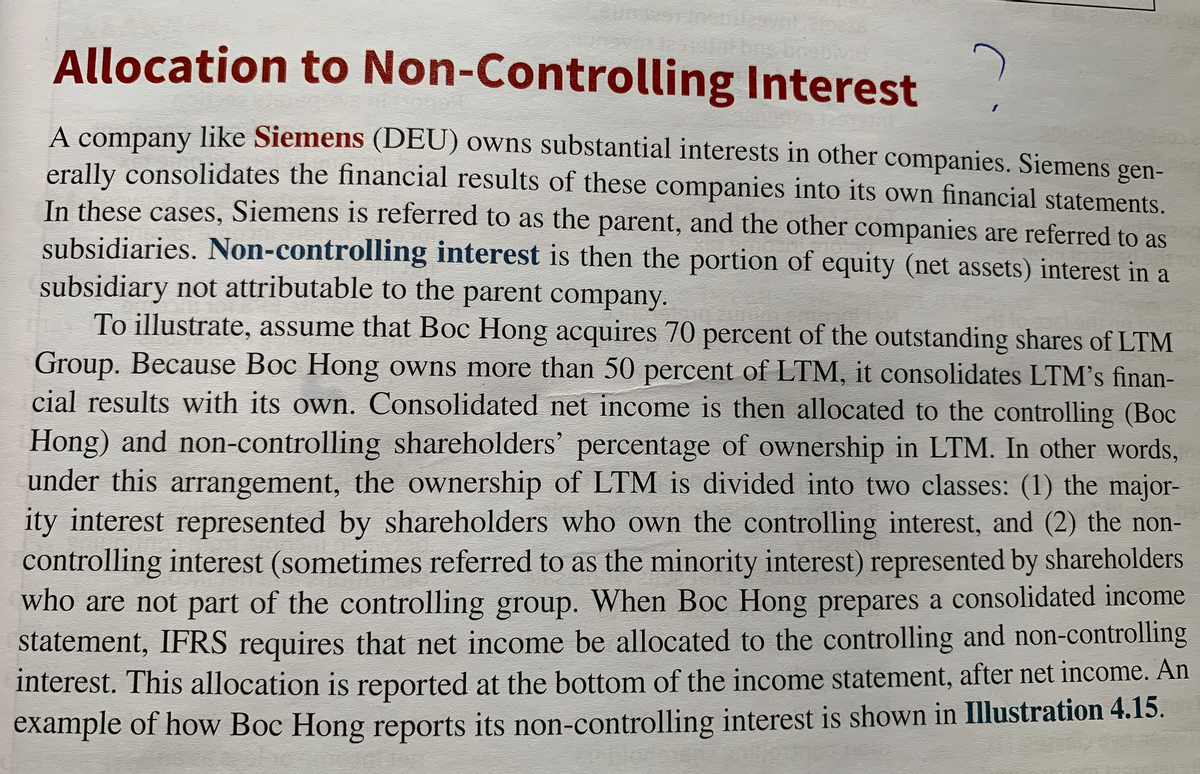Is it the creditors who can earn the interest, but not the shareholders? Shareholders can only earn dividends. correct? So what does the first sentence mean? "Own a significant interest in the company" and "Siemens is called a parent company?" And the second paragraph says shares? Seems it is talking about dividends instead of interest?
Is it the creditors who can earn the interest, but not the shareholders? Shareholders can only earn dividends. correct? So what does the first sentence mean? "Own a significant interest in the company" and "Siemens is called a parent company?" And the second paragraph says shares? Seems it is talking about dividends instead of interest?
Chapter1: Financial Statements And Business Decisions
Section: Chapter Questions
Problem 1Q
Related questions
Question
Is it the creditors who can earn the interest, but not the shareholders? Shareholders can only earn dividends. correct? So what does the first sentence mean? "Own a significant interest in the company" and "Siemens is called a parent company?" And the second paragraph says shares? Seems it is talking about dividends instead of interest?

Transcribed Image Text:51125
Allocation to Non-Controlling
A company like Siemens (DEU) owns substantial interests in other companies. Siemens gen-
erally consolidates the financial results of these companies into its own financial statements.
In these cases, Siemens is referred to as the parent, and the other companies are referred to as
subsidiaries. Non-controlling interest is then the portion of equity (net assets) interest in a
subsidiary not attributable to the parent company.
To illustrate, assume that Boc Hong acquires 70 percent of the outstanding shares of LTM
Group. Because Boc Hong owns more than 50 percent of LTM, it consolidates LTM's finan-
cial results with its own. Consolidated net income is then allocated to the controlling (Boc
Hong) and non-controlling shareholders' percentage of ownership in LTM. In other words,
under this arrangement, the ownership of LTM is divided into two classes: (1) the major-
ity interest represented by shareholders who own the controlling interest, and (2) the non-
controlling interest (sometimes referred to as the minority interest) represented by shareholders
who are not part of the controlling group. When Boc Hong prepares a consolidated income
statement, IFRS requires that net income be allocated to the controlling and non-controlling
interest. This allocation is reported at the bottom of the income statement, after net income. An
example of how Boc Hong reports its non-controlling interest is shown in Illustration 4.15.
ons brebivo
Interest
Expert Solution
This question has been solved!
Explore an expertly crafted, step-by-step solution for a thorough understanding of key concepts.
Step by step
Solved in 2 steps

Knowledge Booster
Learn more about
Need a deep-dive on the concept behind this application? Look no further. Learn more about this topic, accounting and related others by exploring similar questions and additional content below.Recommended textbooks for you


Accounting
Accounting
ISBN:
9781337272094
Author:
WARREN, Carl S., Reeve, James M., Duchac, Jonathan E.
Publisher:
Cengage Learning,

Accounting Information Systems
Accounting
ISBN:
9781337619202
Author:
Hall, James A.
Publisher:
Cengage Learning,


Accounting
Accounting
ISBN:
9781337272094
Author:
WARREN, Carl S., Reeve, James M., Duchac, Jonathan E.
Publisher:
Cengage Learning,

Accounting Information Systems
Accounting
ISBN:
9781337619202
Author:
Hall, James A.
Publisher:
Cengage Learning,

Horngren's Cost Accounting: A Managerial Emphasis…
Accounting
ISBN:
9780134475585
Author:
Srikant M. Datar, Madhav V. Rajan
Publisher:
PEARSON

Intermediate Accounting
Accounting
ISBN:
9781259722660
Author:
J. David Spiceland, Mark W. Nelson, Wayne M Thomas
Publisher:
McGraw-Hill Education

Financial and Managerial Accounting
Accounting
ISBN:
9781259726705
Author:
John J Wild, Ken W. Shaw, Barbara Chiappetta Fundamental Accounting Principles
Publisher:
McGraw-Hill Education